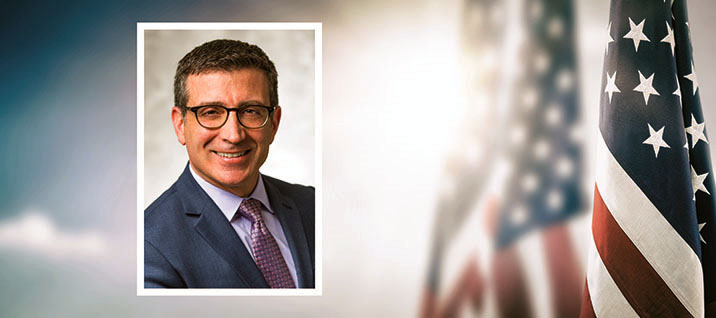Emory's Department of Radiation Oncology observes Veterans Day with a chat with Section Chief for Radiation Oncology at the Atlanta VA Medical Center, Drew Moghanaki, MD, MPH.

November 11, 2019
Emory's Department of Radiation Oncology observed national Veterans Day with a chat with Section Chief for Radiation Oncology at the Atlanta VA Medical Center, Drew Moghanaki, MD, MPH.
Describe your role as Section Chief for the Department of Radiation Oncology at the Atlanta VA? What drew you to working with veterans?
As Section Chief, my job includes helping our department maintain a high level of excellence in cancer care, clinical research, and educational training for our Emory physicians-in-training. This means introducing new initiatives to give veterans better access to innovative clinical care and leading the effort to introduce advanced radiation therapy techniques at the Atlanta VA.
November is Lung Cancer Awareness Month and you are one of Winship’s top experts in lung cancer, the second most diagnosed cancer for veterans in the United States. Can you describe your work leading the VA-PAL initiative and the phase III VALOR trial?
The Department of Veterans Affairs has been committed to improving outcomes for veterans with cancer for many decades and continues to lead the way with several key initiatives. This includes two national projects with a focus on lung cancer that we are currently leading out of the Atlanta VA.
The first is the VALOR phase III randomized clinical trial that is investigating the role of stereotactic radiotherapy as an alternative to surgical resection of early stage lung cancer. 1 The second is the Veterans Affairs Partnership to increase Access to Lung Screening (VA-PALS) program which is introducing broad scale lung cancer early detection programs at 10 VA medical centers across the country.2 Both programs take advantage of support from researchers around the world, while leveraging the scale of the VA to lead efforts that have the potential to improve the quality of life for anyone affected by lung cancer.
What do you think will be the next big move for expanding research and improving clinical care in lung cancer for veterans? How will clinical trials factor into these changes?
The VA currently provides care for over 40,000 veterans diagnosed with cancer each year within a fully integrated health care system. Clinical investigators within and outside the VA are keenly aware of the opportunity this provides, and thus several large-scale initiatives are currently underway that focus on integrating clinical informatics, computational biology, and genomic information from the VA's national Precision Oncology Program.3
Access to clinical trials is an important part of making sure that veterans are receiving the best personalized clinical care. What work is being done to improve accessibility to trials for veterans?
The ACT for Veterans program is a recently launched national initiative that aims to simplify the process of activating multi-site trials within the VA.4 This has the potential to not only increase access to clinical trials for veterans, but also create an opportunity for veterans to become a major part of solving a variety of health care issues.
Throughout your career, you have improved access for VA centers to new radiation therapy technologies like brachytherapy and SpaceOAR. What new radiation therapy technologies or treatment options are being introduced to the Atlanta VA?
We are currently upgrading our department to introduce state-of-the-art radiotherapy technologies that can improve the quality and safety of the care that we offer. We will soon be able to deliver stereotactic body radiation therapy (SBRT) and stereotactic radiosurgery (SRS) with highly advanced image guidance techniques. A new radiosurgery program is also in development, the first of its kind at a VA center. Once operational, it will allow us to provide care for veterans with movement and psychiatric disorders from anywhere in the country.
What is the most rewarding part of your job as Section Chief of Radiation Oncology at the Atlanta VA?
To work at an energetic medical center with highly motivated people in an organization that fosters a culture of service, loyalty and compassion with a mission of providing excellent care to the fine men and women who served this wonderful country.

